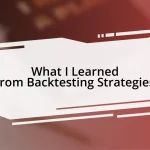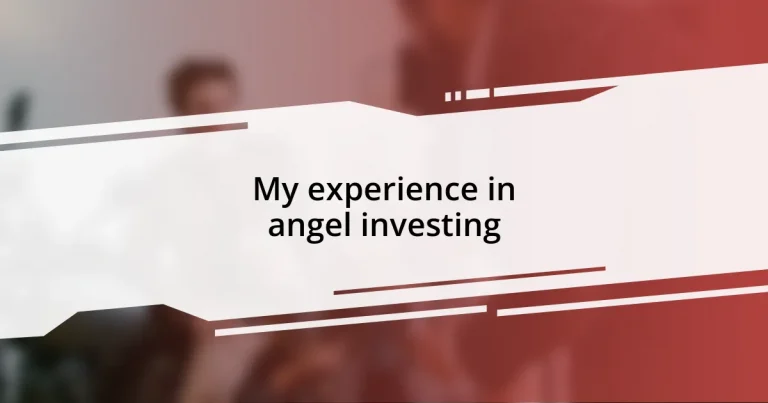Key takeaways:
- Angel investing involves not just funding but also a deep emotional connection and mentorship with entrepreneurs.
- Identifying promising startups relies on evaluating factors like founders’ expertise, market need, and business scalability.
- Understanding a startup’s business model, especially its revenue sources, is crucial for long-term viability.
- Patience and learning from setbacks are vital lessons in angel investing; every misstep provides valuable insights.
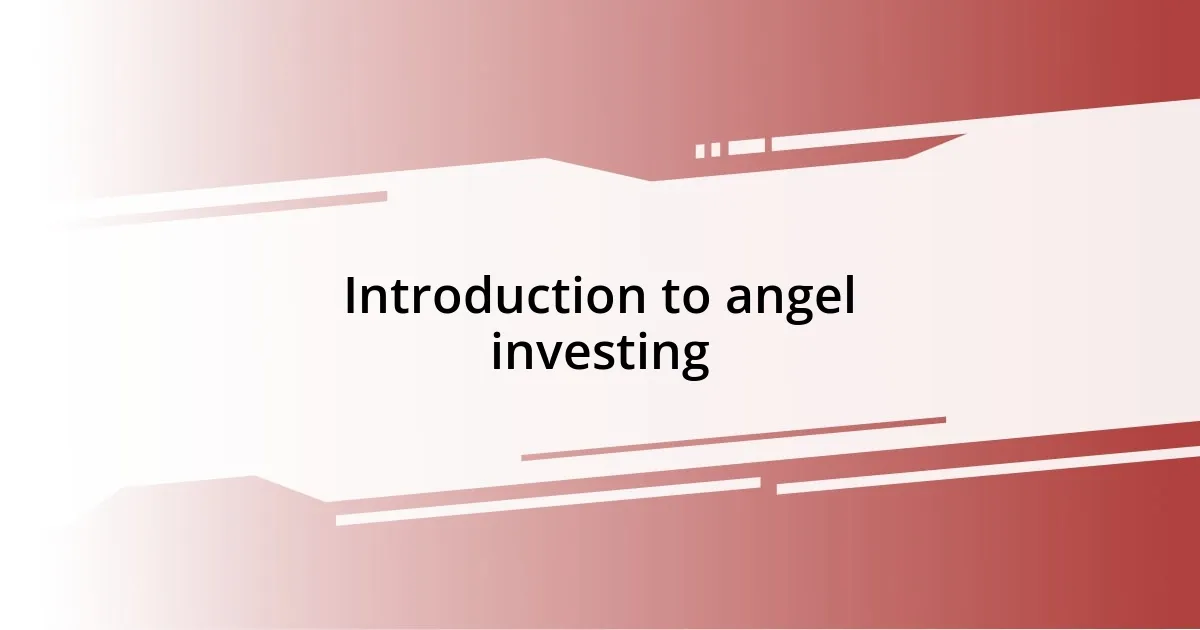
Introduction to angel investing
Angel investing is a unique and thrilling venture where individuals provide capital to early-stage startups in exchange for equity. I still remember the first time I made an investment; the excitement mixed with nervous anticipation was palpable. Could this fledgling idea really turn into something remarkable?
When I think about angel investing, I see it as more than just funding; it’s about believing in founders and their visions. There’s an emotional connection that comes with supporting someone’s dream, and it’s incredibly rewarding to witness a brilliant concept evolve. Have you ever felt that jolt of hope knowing you played a part in something groundbreaking?
This type of investing often requires more than just financial input; it demands discernment and a willingness to mentor. I’ve found myself in countless discussions with passionate entrepreneurs, navigating challenges and celebrating milestones together. It’s a partnership that goes beyond numbers, leaving me with stories that resonate deeply and fuel my enthusiasm for the journey ahead.
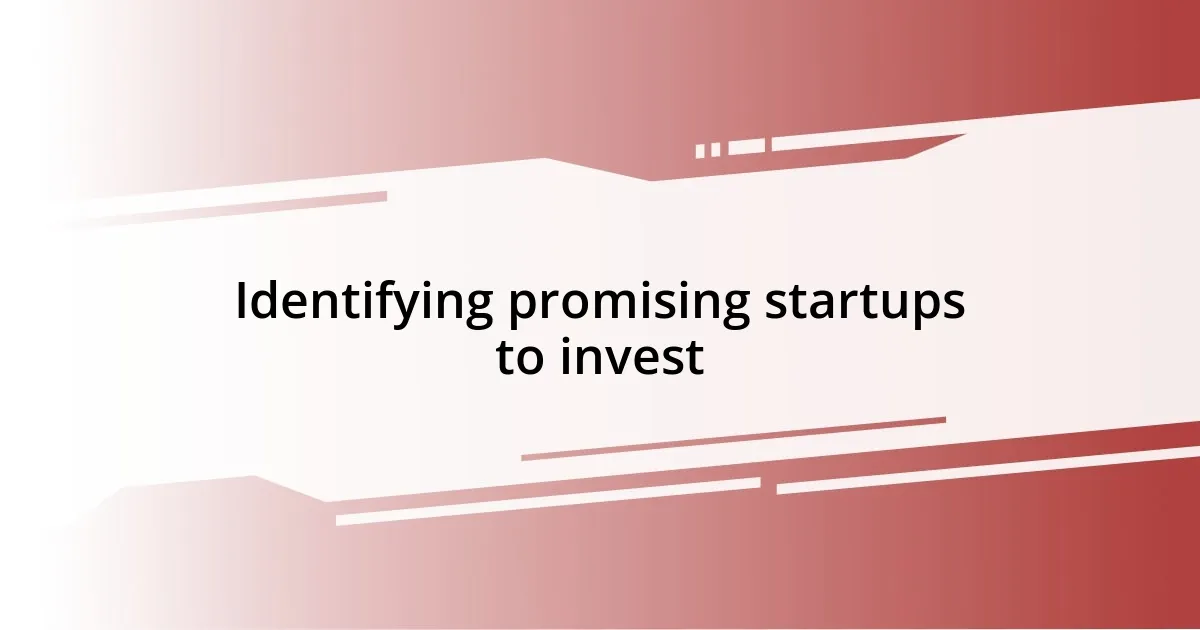
Identifying promising startups to invest
Identifying promising startups can feel like a thrilling treasure hunt. Throughout my journey, I’ve learned that the key to spotting a potential gem lies in the founders’ passion and vision. One specific instance comes to mind: I met a team that was so passionate about sustainable farming they could barely contain their excitement as they pitched. Their genuine belief in making a positive impact resonated with me, and it reinforced how critical it is to pay attention to the people behind the idea.
When evaluating startups, I often focus on a few critical factors:
- Founders’ Expertise: Are they knowledgeable about their industry?
- Market Need: Is there a genuine problem their product solves?
- Unique Value Proposition: What sets them apart from the competition?
- Traction: Have they gained any initial customers or feedback?
- Scalability: Can their business model grow over time?
By honing in on these factors, I’ve made investments that not only felt right but also held the promise of future success. Trust your gut, but back it up with thorough research and conversations.

Evaluating startup business models
Evaluating startup business models is a critical step in my investment journey. I remember sitting across the table from a founder who presented a subscription-based model. It sparked a memory of my own experiences with monthly memberships—I know how convenient and appealing they can be. The question I often ask is, “Does the model create recurring revenue?” If it does, I feel more confident about the startup’s long-term viability.
On another occasion, I encountered a marketplace model. Initially, I was skeptical; after all, the market is flooded with similar platforms. However, I noticed their approach to user experience and customer acquisition was quite innovative. This reinforced the importance of evaluating how a business model not only works on paper but also in practice—what truly matters is how well it attracts and retains customers.
I continuously remind myself that understanding a startup’s revenue streams is vital. I once backed a tech startup that relied solely on one-time transactions. As I watched them struggle to maintain cash flow, it became clear: diversity in revenue sources can provide more stability. This experience taught me to dig deeper when assessing startup business models, considering how adaptable and resilient they truly are.
| Business Model Type | Key Evaluation Points |
|---|---|
| Subscription | Recurring revenue, customer retention |
| Marketplace | Innovative user experience, customer acquisition |
| One-Time Transactions | Cash flow stability, revenue diversity |

Strategies for effective due diligence
When conducting due diligence, I find that a thorough background check on the founding team is essential. For instance, I once invested in a technology startup after discovering their founder had previously built a successful company in the same sector. This experience gave me confidence in his capacity to replicate that success. It made me wonder, how often do we overlook the importance of past accomplishments when sizing up a team?
I also make it a point to verify the startup’s traction through customer interviews. One time, after talking to several users of a fitness app, I unearthed invaluable insights about their experience and willingness to pay. Their genuine feedback not only solidified my decision to invest but also sparked ideas on how the startup could refine its offerings. Have you ever considered that direct conversations with end-users can unveil truths that numbers alone might obscure?
Lastly, I emphasize financial projections rooted in reality. The first time I reviewed a startup’s forecast that seemed overly optimistic, I hesitated. My instincts told me something was off, so I conducted a sensitivity analysis to understand various market scenarios. This revealed potential pitfalls I hadn’t initially considered, emphasizing the importance of a grounded approach to financial expectations. I often think—if numbers don’t add up in real-world scenarios, why should I trust the vision?
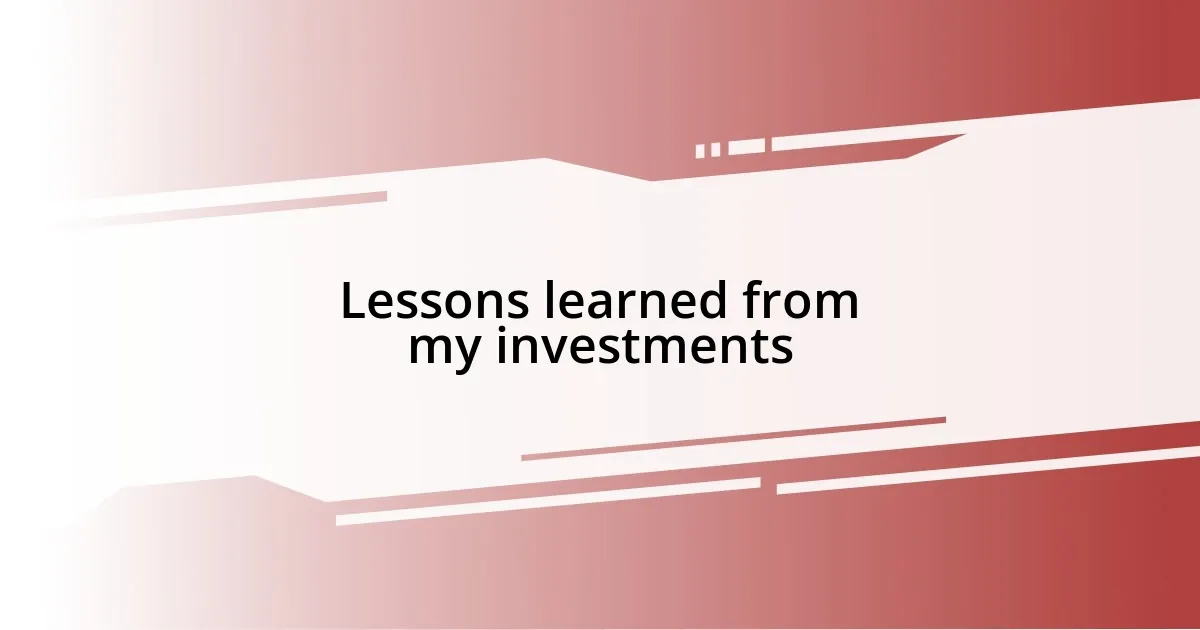
Lessons learned from my investments
Reflecting on my investments, one fundamental lesson stands out: patience is a virtue. Early on, I jumped at opportunities that seemed promising right away but faltered over time. I vividly remember investing in a startup that was too eager to scale before ensuring product-market fit. This experience taught me that rushing can lead to missed red flags. Have you ever stopped to consider if you’re prioritizing speed over substance?
Another crucial takeaway is the value of mentorship and guidance in the investment space. I once partnered with a seasoned investor who had a remarkable knack for spotting potential in unconventional businesses. His insights opened my eyes to sectors I hadn’t considered before. I often think about how vital it is to surround yourself with the right people. Have you ever found that a mentor can shape your perspective and elevate your decision-making?
Lastly, I’ve learned that every setback can be a stepping stone. I had an investment in a promising tech startup that ultimately failed to deliver on its promises. At first, it felt disheartening, and I even questioned my judgment. However, dissecting what went wrong provided invaluable lessons about evaluating market readiness and competitive landscape. Instead of viewing it as a loss, I started to see my investments as a continuous learning journey. How many insights have you gained from your own missteps?







